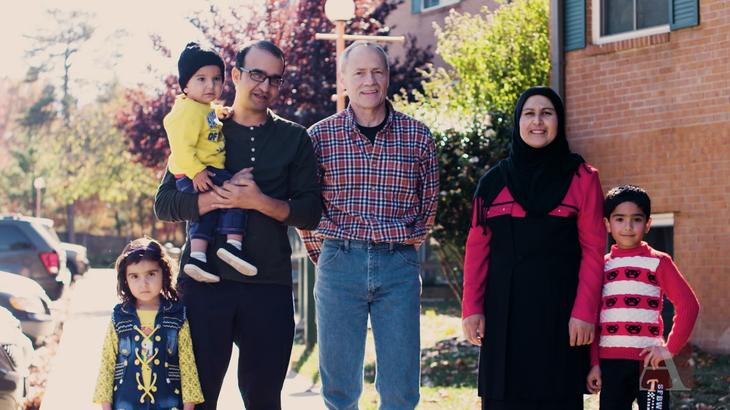On Wednesday, Sept. 26, while President Trump chaired a meeting of the U.N. Security Council, a group of interfaith advocates met in the Church Center at 777 United Nations Plaza and wrestled with issues that stem from the worst global migration crisis since the United Nations’ formation. Undergirding their conversation was the nonbinding Global Compact on Refugees, a recently proposed response framework meant to bolster and refine support for refugees and host countries. The speakers entreated governments in the global north to act more purposefully and humanely, especially given that poorer countries currently house over 80 percent of the world’s 25.4 million refugees.
The compact, which the United Nations is expected to adopt in December, delineates objectives aimed at protecting refugees, in particular, women and children. Among the issues emphasized in the compact are “equitable burden- and responsibility-sharing” between member states and the need to strengthen health and psychosocial services. The international community has not yet developed measures of progress on these objectives.
A parallel compact on migration has issued directives to “use migration detention only as a measure of last resort,” “provide access to basic services for migrants” and “minimize the adverse drivers and structural factors that compel people to leave their country of origin.” To date, all member nations of the United Nations have consented to these and other terms except the United States and Hungary.
The global north has allowed the burden of refugee resettlement to fall primarily on middle- and low-income countries.
The discussion came at a critical juncture, as dignitaries from 193 countries descended on New York for the 73rd session of the United Nations General Assembly, which opened on Sept. 18. As police, diplomats and bodyguards in dark glasses flitted around outside, the clouds above the East River cast gray gloom through the windows of the Church Center. Home to 44 nongovernmental organizations, the center has been touted as the “essential ecumenical” site in New York.
Speakers did not hesitate to acknowledge organizational and governmental shortcomings in the international response to the migration crisis. “We haven’t been as effective as we would like to be at bringing our values to these issues” and recognizing the dignity of the poor and vulnerable, said Joan Rosenhauer, the executive director of Jesuit Refugee Service/U.S.A.
The global north has allowed the burden of refugee resettlement to fall primarily on middle- and low-income countries. Naser Haghamed, the chief executive of Islamic Relief Worldwide, named Libya as an example. The country, a locus of intractable conflict since 2011, has become a “purgatory” where migrants face widespread abuse and are apprehended by the Libyan coast guard when they flee into the Mediterranean. Mr. Haghamed criticized the European Union for not doing more to alleviate the situation: “We are helping others to oppress the refugees.”
“Refugee protection has been politicized...and refugees have been denigrated in our public debate.”
This is a crisis of solidarity, concluded Mr. Haghamed—a crisis beset with muffled convictions and misplaced priorities. Rudelmar Bueno de Faria, the general secretary of the ACT Alliance, a large coalition of churches and faith-based organizations, decried a multinational lurch toward nationalism and nativism. Even “real democracies” said Mr. de Faria, using air quotes, have demonized the vulnerable. In the United States, immigrant children remain separated from their parents, ensconced in an “opaque” and harsh bureaucracy.
Ms. Rosenhauer argued that people—in the United States and throughout the West—have not been challenged to identify with refugees, adding that policy advocacy must be driven by care for the human person. Sean Callahan, the president and chief executive of Catholic Relief Services, agreed that the U.S. church can do more.
Mr. de Faria believes faith leaders must craft a more coherent message to rise above the noise of the 24-hour (or, as Mr. Callahan put it, “2-minute”) news cycle. What that would look like remains unclear.
There was also talk of the narratives of those forced to flee their homes and how they should be demystified. “Refugee protection has been politicized...and refugees have been denigrated in our public debate,” said Don Kerwin, the director of the Center for Migration Studies in New York.
Humanitarian efforts should “enable refugees...to assist in designing appropriate, accessible and inclusive responses.”
Yet the speakers agreed that political decisions in the United States, around the world and at the United Nations affect refugees and propel these crises. They said citizens, governments and faith-based organizations must understand their responsibilities as multi-faceted. Ms. Rosenhauer distinguished between negative duties (to avoid human-induced crises, like those brought on by environmental degradation, which cause people to flee their homes) and positive duties (to care for people who have been displaced).
“We are not speaking out strongly enough,” said Mr. de Faria. “Theology of liberation in Latin America in the ’80s” shaped the political landscape. (Liberation theology, popularized by theologians like Jon Sobrino, foregrounded the preferential option for the poor.) Now, he argued, leaders of all stripes are more reserved for fear of blowback and defunding—so they walk on eggshells.
This crisis of values, coupled with top-down interventions, has resulted in a system that, despite its good intentions, has met with resistance. Mr. Callahan and Ms. Rosenhauer referenced incidents where buildings owned by various humanitarian groups were firebombed or otherwise attacked. They attributed these assaults to a lack of engagement with communities on the part of relief agencies. More recently, said Mr. Callahan, an ethos of “partnership” has begun to replace one of West-knows-best interventionism.
The compact states that humanitarian efforts should “enable refugees and host community members to assist in designing appropriate, accessible and inclusive responses.” This, the speakers said, is the model they hope will power future efforts.
Partnership necessarily entails consulting with community leaders. During the Ebola crisis, for example, experts on the ground advised residents to burn dead bodies to prevent the disease from spreading. Muslims and Christians were reluctant to burn them, and the viral outbreak spread. By working with faith leaders—usually respected by their communities—health workers were better able to disseminate life-saving information.
Other gaps in the popular understanding of the crisis include a general unawareness of the 40 million people who have been displaced within their own countries.
“You can talk about migrants and you can talk about refugees…[but] we can’t forget about others,” said Mr. Callahan.












My country, Australia, has shown refugees - majority of them Muslim - a brutally cold, torturous shoulder
Our new PM has a trophy in the shape of an indonesian fishing boat, commonly used to traffic refugees from Indonesia (illegal, yes, but the asylees are within legal right to claim asylym) - it proudly proclaims "we stopped these"
Our present PM, who was immigration minister at the time, is pentecostal "christian"
Not that pur previous Labor government has clean hands, they ramped up off shore detention to appease the heartless in our nation.
And theres the crux of it. Carelessness. Heartlessness. Hatefulness. Residents of nations who don't care about others. Populist parties that rise to appease them, blocking humanity.
And if they do have humanity, its indirect aid to refugee camps (not direct resettling refugees from these camps), the great copout "look we gave aid, thats not our problem"
What can we do to stop this isolationist, individualist attitude in people, in countries?
Jesus, Mary and Joe were refugees.
Jesus, Mary and Joe were refugees.